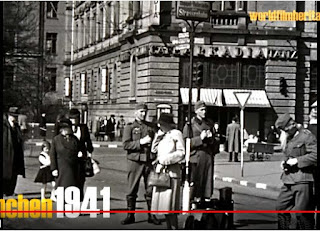In February 24, 1941 Hitler delivered a speech in Munich and by Fall some fifteen hundred Jewish apartments had been confiscated. The Jews who had been driven out of their homes were assigned to forced labor constructing a camp at Milberthausen, a suburb of Munich to accommodate the Jews who were now homeless.
The camp served as an assembly and transit camp for the Jews prior to their deportation to the death camps in the East. Beginning in November, Munich Jews were being deported to extermination camps. That was the backdrop for the Munich chess tournament held September 8-21, 1941.
This event was the Second Europaturnier; the First Europaturnier had taken place in Stuttgart in May 1939. The Munich tournament was organized by Ehrhardt Post, the Chief Executive of the Nazi Grossdeutscher Schachbund from 1933 to 1945.
Alfred M. Ehrhardt Post (September 23, 1881 - August 1, 1947) was a chess master and functionary. He had some major successes in German tournaments and modest results in several international events. Besides the Munich tournaments, Post was the principal organizer of some of the strongest tournaments in Europe at the time.
Former world champion Max Euwe declined his invitation due to "occupational obligations" as manager of a groceries business. He would later decline the invitation to a similar event, Salzburg 1942, for similar reasons. It is speculated that the real motive was that Alekhine, who had written anti-Semitic articles for German publications, was a participant.
Alekhine wrote six Nazi articles which first appeared in the Paris newspaper Pariser Zeitung in March 1941. He wrote a series of articles for the Deutsche Zeitung in den Niederlanden called "Jewish and Aryan Chess." The articles were reproduced in Deutsch Schachzeitung. He had also written about the "Jewish clique" that surrounded Euwe during their 1935 World Championship match.
Alekhine reported on the tournament in his book ¡Legado! (Legacy!) which was published in Madrid in 1946. He wrote that the tournament was of significance, not because Germany had been able to hold a strong international tournament during the war, but because, among many other things, it was a decisive step in the consolidation of European chess and signified “complete emancipation from FIDE, which practically no longer exists.” He pointed out that didn’t mean that if “after the war, there were to be formed a world organization worthy of the name, European chess would not be called upon to play a role, in accordance with its importance.”
He also wrote of the possibility of a European individual and team championship which he thought would “probably appeal to the top European players, including those who, on this occasion, abstained for ‘diplomatic’ or other reasons, and who would in the future be invited to cooperate.”
He praised the organization which made the tournament possible, calling it “a masterpiece” and added that “there was not the slightest friction between the players, and from start to finish there reigned a spirit of camaraderie which made it possible to overcome the numerous difficulties that arose.” Even though they had to play 15 games in 13 days, there was time not only for chess but also for the theater, museums, etc. etc.
He compared the tournament to Semmering-Baden 1937 and AVRO 1938, not in regards to the level of play of course, but in the respect that “the masters had to play in an unsatisfactory atmosphere quite out of keeping with the elevated spirit which the art of chess requires. There were nonetheless excellent individual results, but the sporting performances were falsified by the inevitable physical fatigue of the players..." The had to travel from one Dutch town to another "like exhibition objects or low-grade fighters”
as Alekhine put it.
Of Stoltz, Alekhine wrote his success was not by chance because, besides talent, it required continuous and consistent theoretical work and regular and untiring practice. He also added that Stoltz had a particularly fine feel for unexpected tactics. Speaking of tactical ability, Alekhine wrote that it was something that couldn’t be learned from books and it was what made a player a GM. I also remember listening to a radio interview with Alekhine where he said the same thing about tactics. You either had it or you didn't. Today it's known that tactics can be learned.
Lundin, Alekhine claimed, lacked the fiery style of Stoltz.
Of Bogoljubow and Richter he said that although they weren’t “really of that rank” but the fact that a “great number of Germany’s best players were missing” aided their success.
His comment on Nielson, "the kindly Danish Champion," was that he was "a very experienced player, imperturbably tranquil; despite his defensive approach, he can occasionally be very dangerous in a counter-attack.”
For some time it seemed as if Foltys would also win a prize, but he allowed himself to be strongly influenced by some defeats. The always dangerous Opocensky was tired of chess and apart from his game against Alekhine, he was not able to achieve much.
Kieninger, who was in the German Army, was out of practice and only managed a couple of good games. Alekhine singled out Borislav Rabar as a “very interesting” player, adding that his main defect was insufficient knowledge of the openings.
Paul Mross of Poland played in original and bold style. His beautiful game against Leepin is characteristic of this. The young (21-years old) Peter Leepin of Switzerland was the least experienced player. Alekhine attributed his own “lack of success” to lack of practice.
1) Stoltz 12.0
2-3) Alekhine and Lundin 10.5
4) Bogoljubov 9.5
5-6) Nielsen and Richter 9.0
7) Foltys 8.0
8) Rethy 7.5
9-10) Rabar and Kieninger 7.0
11) Fuster 6.5
12) Mross 6.0
13) Opocensky 5.5
14-15) Rohacek and Cortlever 4.5
16) Leepin 3.0
For the following game against Ivan Rohacek of Czechoslovakia, Alekhine won the First Brilliancy Prize. Rohacek (April 19, 1909 – November 22, 1977, 68 years old), was from Czechoslavakia. He won Slovak championships three times (1930, 1936, and 1939).



No comments:
Post a Comment